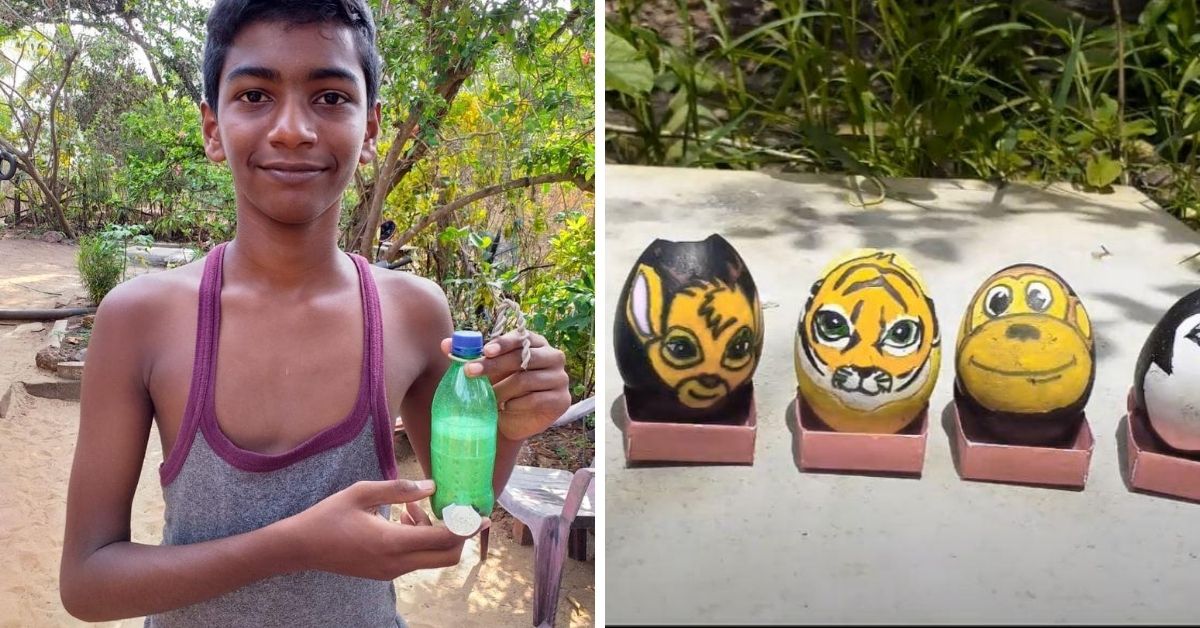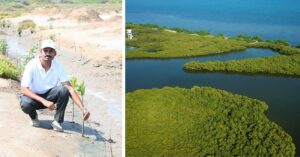With Eggshells & Activism, 15-YO Varad Shows Us All How to Be an Environmentalist
Varad appeals to travellers and motorists, “While travelling, please throw eggshells in the bushes adjoining the road. Yes, you can help nature even while driving in a car. We all can do our bit.”

Varad Kubal, a resident of Achra village in Sindhudurg District of Maharashtra, is 15-years-old. However, he belies his age when he speaks about the fragile ecosystem of his village.
He spent his early childhood on a coconut orchard in Achra, replete with birds, flies, mangroves, and marshes. His parents were teachers at a government school.
And when they left for work, Varad loitered in the greens in the company of his grandfather. He started watching birds and animals and kept fresh water for them. Using Google Lens, he gathered more information about the birds visiting their plantation.
“Ours is a solitary house on the Achra seafront. While Varad was growing up, he had no company. We moved to Kankavli for his schooling, but on weekends and holidays, we leave for Achra. He’s very creative,” share his parents, Latika and Digambar Kubal.
Varad had already made his mark at 12 when he rescued the Bridled terns around three years ago. A hurricane had hit the western coast and injured these hapless migrating birds. Presumably, the recovered birds were driven towards the Konkan coast by the monsoon winds.
“After the storm, I was on the Achra beach, watching the receding tides when I noticed some unusual activity. As soon as the injured and exhausted Bridled terns landed on the coast, a pack of crows started attacking them, and they could not defend themselves. I picked them up and went home,” Varad recalls.
He didn’t know much about these birds, but a search on the internet revealed that they originated from the Caribbean islands and nested in the Persian Gulf, spending their non-breeding season in the Indian Ocean. These amber-coloured birds had long spiky tails measuring 32 cm. But the attack left them wounded.
“I fed them and applied antiseptic lotion on their scars. I looked after them until they were ready to take flight. The Oceanic birds are among the most remarkable but least known of all birds, living at sea, far from the sights of most people.”
Soon, the rescue of birds turned into a mission for the teenager. He found that relentless development activities in the Konkan region endangered the habitats of the birds and many other marine species. Several birds also get caught in the tangled cables or wires hanging all around the cities and towns. Varad rescues the injured and treats them.
“The trees, the birds, and the animals have to bear the brunt of the construction activities in the district. Thousands of trees have already been felled, and the environment around the village has become untenable. Untimely rains, floods, and hurricanes become normal, and we have gotten used to them. Their survival is challenged. I try to take care of them, but they have to go out to the same hurtful world,” the passionate adolescent laments.
Varad’s mission is not limited to the rescue and relief of birds; he’s a keen observer of the coastal and marine biodiversity too.
“Humans adopt violent means, while animals and birds follow a righteous path, isn’t that strange? I saw a cat taking care of an injured baby squirrel. Human immunity is dependent on nature because we too are part of the environment. Our activities also impact all systems of the earth. In Delhi, people suffer from shortness of breath because of the high level of air pollution. That’s why there’s a need to care for our ecosystems. Why worry too much about tomorrow while failing to live in the present today? We should acknowledge what we have and try to preserve it,” says the wise teenager.
The young environmentalist tries to practice what he preaches. In June 2019, he launched a drive planting native varieties like Jambhul (Indian blue berry), Neem (Azadirachta Indica), Banyan (Ficus benghlensis), and Peepal (Ficus religiosa) trees in the region.
Last month, he also planted these saplings on the Achra Bandar (port) along the Mumbai-Goa Highway with fellow conservationists from his class.
Varad’s backyard is full of colourful eggshells. You can see the face of a tiger painted on one and the picture of Mickey Mouse on another. They are part of his novel initiative called ‘seed egg’, where eggshells are used to sow seeds.
He chanced upon this idea after attending the ‘Eureka Science Club’ sessions run by Mangala Keni. The club based in Kankavli promotes scientific temperament and logical thinking among school children. There, he learnt that eggshells are a natural fertiliser, containing high quantities of nitrogen and phosphorus-potassium. The club encouraged the students to drop eggshell shreds in farms and orchards.
This set young Varad thinking and he developed the Eggshell Initiative. He paints eggshells and fills them with soil and the seeds of a local plant. Before sealing the opening, he inserts a fistful of soft coir.
Finally, the eggshell is sealed using glue and paper, and pasted on an empty matchbox.
“If the eggshell finds the right place, it will thrive, and a plant will surely break out of it. You can give it to your friends and spread the word about conservation of natural resources and the environment. It can be an out-of-box birthday gift,” he explains.
Varad appeals to travellers and motorists, “While travelling, please throw eggshells in the bushes adjoining the road. Yes, you can help nature even while driving in a car. We all can do our bit; you play your part by adding them there. After that, the soil, moisture and the environment will do their bit.”
Although he is undecided about his career after class 12, his parents encourage his endeavours. “They are happy about my ventures. I am also more confident now and want to continue my mission,” he says.
(Written by Alka Gadgil and Edited by Shruti Singhal)
This story was previously published on Charkha Features.
If you found our stories insightful, informative, or even just enjoyable, we invite you to consider making a voluntary payment to support the work we do at The Better India. Your contribution helps us continue producing quality content that educates, inspires, and drives positive change.
Choose one of the payment options below for your contribution-
By paying for the stories you value, you directly contribute to sustaining our efforts focused on making a difference in the world. Together, let's ensure that impactful stories continue to be told and shared, enriching lives and communities alike.
Thank you for your support. Here are some frequently asked questions you might find helpful to know why you are contributing?


This story made me
-
97
-
121
-
89
-
167














